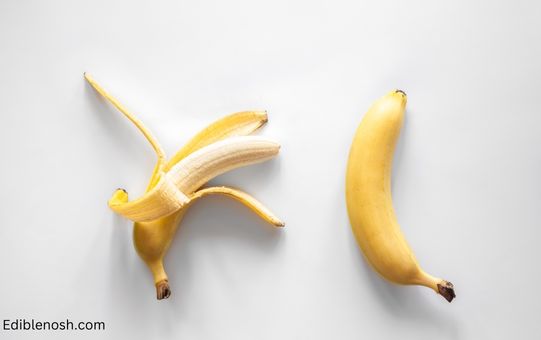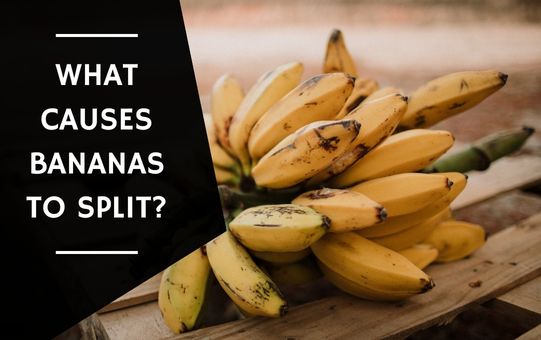Have you ever opened a bunch of bananas to discover what causes bananas to split? It’s especially aggravating if you wanted to use them in a dish or as a quick snack.
Age, temperature and storage, handling and transport, pesticides and chemical residues, and genetic factors can cause bananas to split. To prevent bananas from splitting, store them at room temperature, handle them gently, choose organic bananas or thoroughly wash non-organic bananas, and select varieties that are less susceptible to splitting.
However, why do bananas split in the first place? This article will discuss the causes of banana splitting and how to prevent it from occurring.
Contents
Factors That Can Cause Bananas to Split
There are several factors that can contribute to banana splitting. Some of the most common ones include:
- Age and Ripeness: One of the most common causes of banana splitting is simply age. As bananas mature and ripen, the skin begins to thin and become more prone to splitting. This is especially true if the bananas are left on the stem for an extended period of time. If you notice that your bananas are starting to split or have brown spots, it’s probably because they are past their prime and are starting to go bad.
- Temperature and Storage: Temperature and storage can also play a role in banana splitting. If bananas are stored in a place that is too cold, the skin can become brittle and more prone to splitting. On the other hand, if they are stored in a place that is too warm, they can ripen too quickly, which can also lead to splitting. It’s best to store bananas at room temperature and in a place that is not exposed to direct sunlight or heat.
- Handling and Transport: Another factor that can contribute to banana splitting is rough handling and transport. If bananas are bumped or bruised during the transportation process, it can cause the skin to split or become damaged. It’s important to handle bananas gently and carefully to avoid this from happening.
- Pesticides and Chemical Residues: Pesticides and chemical residues can also cause bananas to split. These substances can be absorbed by the skin of the banana and can weaken the structure of the skin, making it more prone to splitting. If you’re concerned about pesticides and chemical residues, opt for organic bananas or wash your bananas thoroughly before consuming them.
- Genetic Factors: Finally, genetic factors can also play a role in banana splitting. Some varieties of bananas are more prone to splitting than others due to their genetic makeup. If you find that bananas from a certain grower or region tend to split more often, it could be due to the genetics of the bananas themselves.
Read Also: How To Prevent Overripe Bananas?
How to Prevent Bananas from Splitting?
Now that we’ve explored some of the factors that can cause bananas to split, let’s talk about what you can do to prevent it from happening. Here are a few tips:

- Store bananas properly: Bananas are best stored at room temperature, away from direct sunlight and heat sources. If you live in a hot climate, you may want to store your bananas in the fridge to prevent them from ripening too quickly. Just be sure to take them out of the fridge a few hours before you plan on eating them, as the cold temperature can cause the skin to split.
- Handle bananas gently: When transporting or handling bananas, be gentle and avoid rough handling or dropping them. This will help to prevent the skin from becoming damaged and splitting open.
- Check for insects: If you notice any signs of insect damage on your bananas, it’s best to discard them to prevent the damage from spreading. This is especially important if you live in an area where the banana weevil is prevalent.
- Use split bananas quickly: If you do end up with a split banana, it’s important to use it up as soon as possible. Split bananas are more prone to spoilage, so it’s best to enjoy them within a day or two of opening.
Read Also: Why Do Bananas Give Me Heartburn?
Conclusion
I hope this article was helpful and gave you a better understanding of the causes of banana splitting. If you have any additional questions or would like more information on this topic, feel free to ask!
FAQs | Causes Bananas to Split
Here are a few faqs related to the causes of banana split that most people ask around the world:
What Is The Main Cause Of Banana Splitting?
The main cause of banana splitting is age and ripeness. As bananas mature and ripen, the skin begins to thin and become more prone to splitting.
If the bananas are left on the stem for an extended period of time, they are more likely to split or develop brown spots.
Can Temperature And Storage Affect The Likelihood Of Banana Splitting?
Yes, temperature and storage can play a role in banana splitting. If bananas are stored in a place that is too cold, the skin can become brittle and more prone to splitting.
On the other hand, if they are stored in a place that is too warm, they can ripen too quickly, which can also lead to splitting. It’s best to store bananas at room temperature and in a place that is not exposed to direct sunlight or heat to prevent splitting.
Can Handling And Transport Cause Bananas To Split?
Yes, rough handling and transport can contribute to banana splitting. If bananas are bumped or bruised during the transportation process, it can cause the skin to split or become damaged. It’s important to handle bananas gently and carefully to avoid this from happening.
Can Pesticides And Chemical Residues Cause Banana Splitting?
Yes, pesticides and chemical residues can cause bananas to split. These substances can be absorbed by the skin of the banana and can weaken the structure of the skin, making it more prone to splitting.
If you’re concerned about pesticides and chemical residues, opt for organic bananas or wash your bananas thoroughly before consuming them to remove any residue.
Can Genetic Factors Play A Role In Banana Splitting?
Yes, genetic factors can also contribute to banana splitting. Some varieties of bananas are more prone to splitting than others due to their genetic makeup.
If you find that bananas from a certain grower or region tend to split more often, it could be due to the genetics of the bananas themselves.

